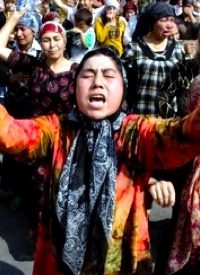
According to a July 8 Voice of America report, Liu Yaohua, Xinjiang’s police chief, blamed the World Uighur Congress, a Uighur rights group, for stirring up the unrest, and he pointed to the Internet as the chief means of communication between Uighurs both inside and outside of China. The Chinese government accuses groups like the World Uighur Congress of inciting a riot from long distance as part of an effort to create an independent Xinjiang.
Uighur activists say that the July 5 demonstration in Urumqi, Xinjiang’s capital, was peaceful until police moved in to break it up. Chinese authorities quickly cut off Internet service in Urumqi and did not indicate how long it would be out. Cellphone connections still functioned within the city, but calls in or out of the city were experiencing disruptions. In Beijing, the Twitter messaging system was disabled. Chinese officials are obviously trying to avoid the difficulties that the Iranian government experienced with modern means of communication.
Xiao Qiang, a journalism teacher at the University of California-Berkeley, confirmed that the “Internet is playing a bigger role this year, partially because what happened in Urumqi was immediately exposed by lots of cell-phone cameras, digital cameras, videos — there’s a lot of witness(es), people [who] immediately wrote and sent out video images on the Internet.”
David Bachman, a professor of Chinese studies at the University of Washington, says that the Internet is actually a two-edged sword. While it allowed images of the crackdown to be spread far and wide, exposing what Bachman calls an “extensive” and “in some ways merciless” use of force, it also serves the aims of China’s totalitarian regime. “Clearly,” Bachman said, “the Chinese government is saying to Uighurs and to others in Xinjiang and to Tibetans and other minority groups, or for domestic protesters in the heart of China, that protests will be met with strict and harsh measures. Don’t even think about it.”
Bachman notes that there are no quick fixes for the inequality and discrimination experienced by the Uighur minority at the hands of the Han Chinese majority, but the only true solution is to address these underlying issues. Violent crackdowns and suppression of communication via cellphones and the Internet give the oppressive Chinese goverment a short-term solution that will only foster more suspicion, resentment, and opposition over the long term.
Photo: AP Images



